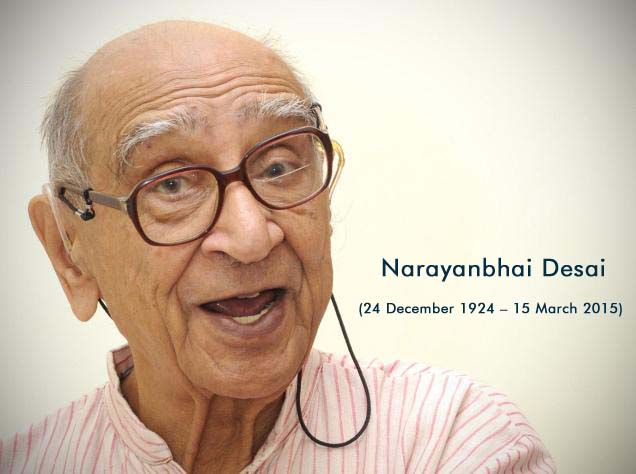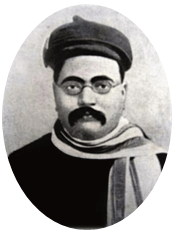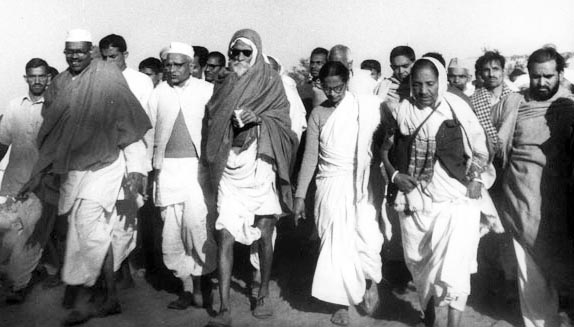Thursday, April 30, 2015
Wednesday, April 29, 2015
Tuesday, April 28, 2015
Monday, April 27, 2015
Newsletter: Remembering Gokhale
Remembering Gokhale
A great nationalist leader and social reformer who influenced economic and development thinking.
Gopal Krishna Gokhale was born on May 9, 1866, and died at the age of 49, on 19 February 1915. During this year and next, we mark a centenary of his death anniversary, and also his 150th birth anniversary. He is described as one of the founding leaders of India's independence movement, having risen to become the President of the Indian National Congress in 1905.
Saturday, April 25, 2015
Friday, April 24, 2015
Thursday, April 23, 2015
Wednesday, April 22, 2015
Tuesday, April 21, 2015
Monday, April 20, 2015
Saturday, April 18, 2015
Vinoba's Bhoodan Movement: An Overview
Vinoba's Bhoodan Movement: An Overview
On 18 April, 1951, Vinoba got 100 acres of land as donation in Pochampalli village of Andhra Pradesh. Thus, triggered the phenomenal Bhoodan-Gramdan and people’s movement. Now more than 60 years have gone by and it is now time to attempt having an overview of the movement.
In reality, the movement was only part of an overarching movement called Sarvodaya. Therefore, when we attempt to overview Bhoodan, the context would be the entire Sarvodaya movement.
In reality, the movement was only part of an overarching movement called Sarvodaya. Therefore, when we attempt to overview Bhoodan, the context would be the entire Sarvodaya movement.
Friday, April 17, 2015
Thursday, April 16, 2015
Wednesday, April 15, 2015
Tuesday, April 14, 2015
Monday, April 13, 2015
Saturday, April 11, 2015
Friday, April 10, 2015
Thursday, April 9, 2015
Gandhi Journal Article-III : Inclusive growth through Self-Help Groups - A Gandhian Paradigm of Sustainable Development
Inclusive growth through Self-Help Groups - A Gandhian Paradigm of Sustainable Development
By Dr. Marina B. Pereira
India faces many challenges in the New Millennium. Most notable among them is attaining the objective of Inclusive growth and reducing the Great Divide between the haves and the have-nots. Efforts should be made to bridge this gap because grinding poverty in dehumanized conditions may sow the seeds of a violent revolution. Mahatma Gandhi understood the flaws of the Percolation or top-down development model where power-relations were centralized. Bapu's paradigm of society is governed by the principles of interdependence, complementarity, fraternity, consensus and participatory management.
Only Inclusive growth will lead to sustainable development. In this context Gandhiji's concept of development namely Sarvodaya through Antyodaya, implying the welfare of all through the weakest of the society holds great value. The plans for the economic development of our country should make a beginning from the bottom of the pyramid with the people who have been left behind or swept aside.
Only Inclusive growth will lead to sustainable development. In this context Gandhiji's concept of development namely Sarvodaya through Antyodaya, implying the welfare of all through the weakest of the society holds great value. The plans for the economic development of our country should make a beginning from the bottom of the pyramid with the people who have been left behind or swept aside.
The objective of this Paper is to analyse the application of the Gandhian economic model through rural Self-Help Groups (SHGs) to attain the objectives of inclusive growth and sustainable development in the New Millennium. Collective empowerment through SHGs can remove deprivation and social exclusion. This model is based on the notion that the marginalised are better equipped to overcome the negative social pressure against them through group identity and activity. This paradigm of Development is based on Gandhian principles like Sarvodaya, Antyodaya, co-operation, collective endeavour, trusteeship and decentralisation with primary importance to community welfare and villages.
Wednesday, April 8, 2015
Tuesday, April 7, 2015
Gandhi Journal Article-II : What Mahatma Gandhi did to save Bhagat Singh
What Mahatma Gandhi did to save Bhagat Singh
By Chandan Pal Singh
Gandhi's failure to secure commutation of Bhagat Singh's execution has provided his critics a convenient weapon to attack him. He has been accused of making half-hearted effort and even deception - for the alleged discrepancy between his actual role and his public statements. This paper attempts to establish that while following a consistent approach towards revolutionary violence, Gandhi tried his best to save the lives of Bhagat Singh and his collegues till the last moment. The paper also discusses Gandhi's strategy to focus on suspension rather than commutation of the death sentence.
Monday, April 6, 2015
Saturday, April 4, 2015
Gandhi Journal Article-I : A bridge to the times of Gandhi - An interview with Narayan Desai
A bridge to the times of Gandhi - An interview with Narayan Desai
By By T. Kannan

This is an account of my interview with Narayan Desai in September, 2012. The Tamil version of the interview was posted in GandhiToday.in.
"I am Gandhi’s friend. He used to swim with me.” This was how Narayan Desai, who was on his way from Madurai to Vedchchi, introduced himself to my 4-year old daughter when we met him at Chennai, last year.
The previous week, the moment I heard that Narayan Desai was delivering his Gandhi Katha at Madurai, I decided to go there from Chennai. I had been wishing to meet him for a couple of years and had enquired a Gandhian friend about his whereabouts only a few days earlier. Narayan Desai is one of the few amongst us, who have interacted closely with Gandhi.
Narayan Desai has captured and presented a historical hero through the eyes of a child. He is Mahadev Desai’s son. He grew up in Gandhi’s ashrams. Later, he was an active co-worker with Vinoba Bhave and Jayaprakash Narayan. He played a leading role in the Sarvodaya movements like Bhoomidhan and Shanti Sena. Now he runs the Sampoorna Kranti Vidyalaya. He is the Chancellor for Gujarat Vidyapeeth, started by Gandhi during non-cooperation movement. He has written the biographies of Gandhi and Mahadev Desai. Along with Kanti Shah, he has also edited an important work on JP, in Gujarati, ‘Jayaprakash’.
Subscribe to:
Posts (Atom)























